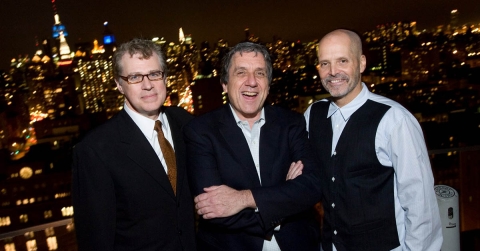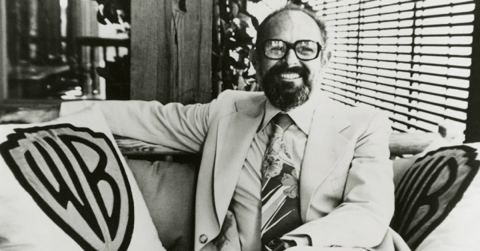By Robert Hurwitz
Is it possible for a great talent to go unnoticed in music? That's a question posed by Nonesuch Records President Robert Hurwitz in an essay for the Nonesuch Journal.
By Robert Hurwitz
Is it possible for a great talent to go unnoticed in music?
More than two decades ago, the eminent author Doris Lessing attempted to publish a manuscript under a pseudonym, Jane Somers, and the book was rejected by every publisher to whom she sent it, including her own. It ultimately had a small run, was ignored by the critics, and only when she went public as to her own authorship was the book (and a follow-up) finally taken seriously.*
Lessing was interested in showing the difficulties that unknown authors had in terms of not only reaching a public, but in being taken seriously by publishing houses.
I have often thought about this story as it relates to what we do at Nonesuch, where we are presented with many new and often worthy demos every week, as well as solicitations from artists, lawyers, and managers. On top of that, we seek out, through our staff’s collective curiosity, the musicians we read about, hear about from friends, or trip over on the Internet.
Of course, there are profound differences between the book publishing and the music business. One can experience a song in a few minutes or an entire album in an hour, while it takes a longer time to go through a manuscript—although one editor friend told me that just as we can get a sense of a song or an artist in the first 30 seconds, he can get a sense of an author’s voice in a page (which makes me wonder how Lessing’s own editor could have missed her voice as completely as he/she apparently did).
All of this leads to a related question: is it possible for a great talent to go unnoticed in music? Further: can there be just one person who has recognized a talent and then, because of his or her actions, be deemed fully responsible for the world knowing that artist?
One of the most famous stories in record company annals is that of John Hammond discovering and signing Bob Dylan. As someone who grew up loving Bob Dylan and loving the legend of John Hammond, for years I believed that if Hammond had never been born, we would never have heard of Dylan. But in reading Dylan’s Chronicles it becomes clear that while Hammond was the first person in the music business to recognize Dylan’s talent, he did not “discover” him. On his own, Dylan began to gain a reputation in his early days performing in the Village; almost every peer he mentions ended up making records (even including Tiny Tim), and if it had not been Hammond, it would eventually been someone else. Of course, what was impressive about Hammond is that he knew to stay out of the way of Dylan’s talent, and did not try to steer him in a direction that was inappropriate. And of course, he fought to keep Dylan on the label until the public could fully appreciate his genius.
Likewise, there has not been a single Nonesuch artist that we “discovered” without someone tipping us off—whether it was a musician, a friend, a producer, a critic, or an article one of us read. In 1977, I spent a week in Corniglia, Italy, with the Italian trumpeter Enrico Rava and his wife Graciela; while I was there, the Ravas played records by two musicians I had never heard of, Astor Piazzolla and Caetano Veloso. If it hadn’t been then, I surely would have found out about them sooner or later, but at that point, almost no one in America knew either Caetano or Astor. But Graciella was an Argentine Italian, and was a friend of Piazzolla, and they both knew personally Caetano as well.
There are countless similar stories. Over lunch with the journalist Tim Page in 1981, he told me about a new composer named John Adams and his recording on 1750 Arch of Shaker Loops. I got a tape of a Naumberg Competition recital by an unknown singer named Dawn Upshaw from producer Tom Frost. Conductor Eric Stern first told me about Audra McDonald, and John Zorn wrote me a letter introducing himself and included a tape (but before that four people had told me about him). Omus Hirshbein, who once ran the music program at the 92nd St. Y, called me in early 1996, and said, “You have to go to Playwright’s Horizons and see a show called Floyd Collins.” Adam Guettel? Except for people who lived in the theater world, who knew Adam Guettel?
Dawn Upshaw, Caetano Veloso, John Zorn, Adam Guettel, and Audra McDonald all released their first major-label American albums on Nonesuch, but I certainly did not discover any of them.
I think it is always possible to be the first to hear someone’s talent, but I think the nature of talent is something that reaches beyond just one person, and becomes apparent to communities of listeners who come to it with a similar point of view.
For instance, the case of John Adams—it’s not just Nonesuch that “likes” John Adams. There is something in his music that has attracted the two most important classical publishers in America, G. Schirmer and Boosey & Hawkes (he has had deals with both); he has attracted dozens of important conductors (Esa-Pekka Salonen, Michael Tilson Thomas, Simon Rattle, Leonard Slatkin, David Zinman, Alan Gilbert), soloists (Emanuel Ax, Gidon Kremer, Leila Josephewicz), directors, choreographers, filmmakers, and authors, all of whom have heard something in his music that has touched them deeply. If Nonesuch were not part of the equation, John’s music would still be performed, heard, recorded, and widely admired around the world.
On occasion, in the long run, the music business can have a democratic nature. Ultimately people decide what it is they care for deeply, and if their interest continues after a brief, sensational moment (the kind of moment we often see in the pop music business), it is not because a record company spent a lot of money or because someone has manipulated the system. It’s because that music has the resilience to stand the test of time.
So who really is the first person to hear a great talent? Probably a music teacher, maybe a parent, possibly a friend, or possibly another musician. If the talent is really there, the chances are, the world will eventually hear about it.
---
* Diary of a Good Neighbour (1983) and If the Old Could ... (1984)


